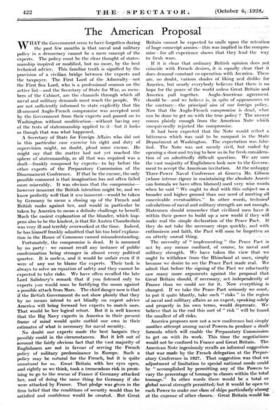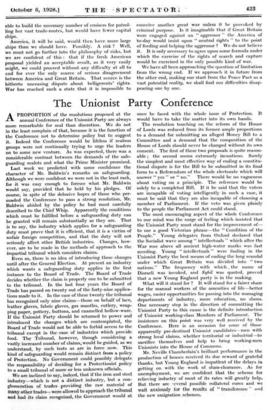The American Proposal
WHAT the Government seem to have forgotten during Y V the past few months is that naval and military policy in a democracy cannot be a mere concept of the experts. The policy must. be the clear thought of states- manship inspired or modified, but no .more, by the best technical advice. This familiar truth is signified by the provision of a civilian bridge between the experts and the taxpayer. The First Lord of. the Admiralty—not the First Sea Lord, who. is a professional seaman on the active list—and the Secretary of State for War, as mem-, bers of the Cabinet, are the channels through which all naval and military demands must reach the people. We are not sufficiently informed to state explicitly that the ill-omened Anglo-French compromise was accepted neat by the Government from their experts and, passed on to Washington without modification—without having any of the tests of statesmanship applied to it—but it looks as though that was what happened.
A Secretary of State for Foreign Affairs who did not in this particular case exercise his right and duty of supervision might, no doubt, plead some excuse. .He might say that the matter had not yet reached the sphere of statesmanship, as all that was required was a draft—frankly composed by experts—to lay before the other experts of the Preparatory Commission of the Disarmament Conference. If that be the excuse, the only possible comment is that imagination has not often failed more miserably. It was obvious that the compromise— however innocent the British intention might be, and we know perfectly well that it zoos innocent—would be taken by Germany to mean a closing up of the French and British ranks against •her, and would in particular be taken by America to mean a definite challenge to herself. Much the easiest explanation of the blunder, which hap- pens also to be the kindest, is that Sir Austen Chamberlain was very ill and terribly overworked at the time. Indeed, he has himself frankly admitted that his too brief explana- tion in the House of Commons caused misunderstanding.
Fortunately, the compromise is dead. It is mourned by no party : we cannot recall any instance of public' condemnation being stronger in almost every political quarter. It is useless, and it would be unfair even if it were of any use to blame the experts. Their task is always to solve an equation of safety and they cannot be expected to take risks. We have often recalled the late• Lord Salisbury's remark that if you listened only to experts you would soon be fortifying the moon against a possible attack from Mars. The chief danger now is that if the British Government do not show plainly that they by no means intend to act blindly on expert advice America will bring forward her experts to match ours.- That would be her logical retort. But it is well known• that the Big Navy experts in America in their present frame of mind would quite outbid our own in their estimates of what is necessary for naval security.
No doubt our experts made the best bargain they possibly could in the circumstances. But it left out of account the fairly obvious fact that the vast majority of Englishmen are not in favour of serving the French policy of military predominance in Europe. Such a policy may be natural for the French, but it is quite - unnatural for us. Great "Britain with her eyes open, and rightly as we think, took a tremendous risk in prom- ising to go to the rescue of France if Germany attacked her, and of doing the same: thing for Germany if she were attacked by France. That pledge was given in the firm belief that the conditions of security would thus be satisfied and confidence would be created. But Great Britain cannot be expected. to smile upon the retention of huge conscript armies,--this was implied in. the compro, mise—for all experience shows that they. lead . the -way to fresh wars.
If it is clear that ordinary British opinion does .not coincide with French desires, .it is. equally clear that it does demand constant co-operation with An:erica. There are, no doubt, various . shades of liking and dislike for America, but nearly everybody believes that -there 'is no. hope for the .peace of.the world unless Great Britain and America pull together. Anglo-American agreement should be—and we believe is, in spite of appearances to the contrarythe principal aim . of our foreign policy. Now that the Anglo-French compromise is dead, what can be done to get on .with the true policy'? The Answer comes plainly enough front the 'American Note- which unequivoeally rejected the compromise.
It had been expected that the Note would reflect a bitterness which was said to be rampant in the State Department at Washington. The expectation was falsi, fied. The Note was not merely civil, but ended-by opening a door and trying to bow us in for fresh considera- tion of an admittedly difficult question. We. are sure the vast majority, of Englishmen look now to the GoVerni. merit to accept the American invitation. At the unhappy Three-Power Naval Conference - at Geneva Mr.. Gibson (whose intense rigour in maintaining-the absolute Ameri4 can formula we have often blamed) used very wise words when he said We ought to deal- with this. subject: on a broader and higher ground than our need- of meeting all conceivable eventualities." In other words, . technical calculations of naval and military strength are not enough. Statesmen should remember that civilized -men have it within their power to build up a 'new world if they -wilt make real the simple declaration of the Peace Pact. If they do not take the necessary steps quickly, and with enthusiasm and faith, the Pact will soon be forgotten .a§ an utterly unreal thing. . - . .
The necessity of 4` implementing''. the Peace Pact is. not by any - means confined, of course, to naval and military strength. We have taken- the view that -we• ought to withdraw from the Rhineland at once, simply because we desire to see the Peace Pact made real. We admit that before the signing of the Pact we reluctantly: saw many more arguments against the proposal that- Great Britain should,- if necessary, act independently of France than we could see for it. Now everything is- changed. If we take the Peace Pact seriously we must,. to put it quite bluntly, take such "- risks " in the region. of naval and military affairs as an- expert, speaking solely- and properly, in his own terms, would • deprecate.. We' believe that in the end this sort of " risk " will be, foancl. the smallest of all risks.
America proposes now not a new conference but simply another attempt among naval Powers.to produce a draft! formula- which will enable the Preparatory Commission to get on with its work. This time the negotiations- would not be -confined to France and Great Britain.. The-- American Note ingeniously recalls an informal suggestion:. that was made by. the French delegation at the Prepar- atory Conference in 1927. . That suggestion was that an. adjustment of limitation to special national. needs--could-: be " accomplished by permitting any of the Powers-to, vary the percentage of tonnage-in classes within the total tonnage." In other words there would be a total.Or. global naval strength' permitted;- but it would be open zt-k- each Power-to make one-class of ships particularly:strong • at the expense of other classes. • Great Britain would Iasi able to build the necessary number of cruisers for patrol- ling her vast trade-routes, but would have fewer capital ships.
America, it will be said, would then have more large ships than we should have. Possibly. A risk ? Well, we must not go further into the philosophy of risks, but we are confident of this : that if the fresh American proposal yielded an acceptable result, as it very easily might, we could proceed without any difficulty at all to end for ever the only source of serious disagreement between America and Great Britain. That source is the hitherto unceasing dispute about belligerents' rights. War has reached such a state that it is impossible to conceive another great war unless it be provoked by criminal purpose. Is it imaginable that if Great Britain were engaged against an " aggressor " the America of to-day would insist upon " neutral rights " to the point of feeding and helping the aggressor ? We do not believe it. It is only necessary to agree upon some formula under which the exercise of the rights of search and capture would be exercised in the only possible kind of war.
We have all been approaching the question of limitation from the wrong end. If we approach it in future from the other end, making our start from the Peace Pact as a vast potential reality, we shall find our difficulties disap- pearing one by one.























































 Previous page
Previous page